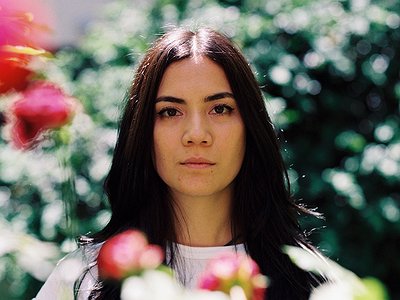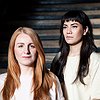Name: Sibel Jacqueline Koçer aka JakoJako
Nationality: Turkish/German
Occupation: Sound artist, composer, producer
Current release: JakoJako teams up with Mareena for Atlas der Gedanken, out now via Edition Dur.
Gear Recommendations: Free VST Nova Dynamic EQ; Composing Electronic Music by Curtis Roads (book)
[Read our Mareena interview]
If this JakoJako interview piqued your interest, visit her on Instagram, and Soundcloud.
The views of society towards technology are subject to constant change. How would you describe yours?
I like to adapt to new circumstances if they interest me. For example, a new device.
Regarding AI, I'm curious what will happen with the music.
What were your very first steps in music like and how would you rate the gains made through experience - can one train/learn being an artist/producer?
I always wanted to be a guitarist when I was a little kid. I remember standing with my parents in front of a music school, but it was closed. I was 2-3 then, after that came a series of moves to different cities and life took a turn.
When I was about 4 or 5, my mother tried to get me into piano lessons, but it didn't really work. I was way too hyper for that haha. I then started doing a lot of sports and dancing. I think dance and music belong together!
I've always been into music. And fascinated by how electronic music is made. I have always listened carefully but never made music. I think actively listening to music is the first step to making music. At one point in the beginning of my 20s I bought synths and that's how it all started. I only learned because I was seriously interested. If I'm not really interested, then I start different things at the same time and don't finish anything.
Producing was the first of a lot of hobbies that managed to keep me sitting on my butt for several hours concentrating. So to answer your question, I think you can learn to be a producer if you’re seriously interested in it.
Mareena & JakoJako Interview Image by Mv Kummer
Making music, in the beginning, is often playful and then becomes increasingly professionalised. How important is playfulness for you today and if it is important, how do, concretely, you retain it?
It’s very important and I don’t see a problem in keeping or maintaining it for me. I should probably be more professional sometimes!
Which other producers were important for your development and what did you learn from them?
When I moved to Berlin, I met many different artists from all over the world who worked in a variety of disciplines. I learned about alternative ways of living and thinking. I think that helped me to get out of the spiral of the classical way of making money and surviving.
When Leisure System asked me to release a record, it was the first time that I felt my tracks were good enough. Barker gave me good feedback on my work and I was surprised how gentle he was and how little he actually criticised. I had expected much more and harsher criticism; I was expecting that because other friends were sending their music to record labels and telling me horror stories.
I think the way how established people in the Industry treat you as an artist in the very first steps of your career shape you for the rest of your artist future. Some people give up early because of this.
So I think Leisure System and Barker were the perfect environment and influenced me in a good way. Now Daniel Miller and Mute records have a huge impact on me, with every meeting or phonemail I learn something new about the administrative side of making music. Although Daniel Miller and I also like to talk a lot about gear.
How and for what reasons has your music set-up evolved over the years and what are currently some of the most important pieces of gear and software for you?
My live set up keeps shrinking. As I travel and tour alone, i.e. without a tour manager etc., I also have to carry everything alone. That's why I make a kind of sodoku out of packing gear as smartly as possible. A lot of sound and little luggage is the motto.
Circumstances like sandy festivals also have an influence. I can't bring my modular case to all festivals in the Summer. If I did that, all the potis would scratch afterwards. And some modules can't be replaced as they are not available anymore, and I need them for producing.
Have there been technologies which have profoundly influenced, changed or questioned the way you make music?
Before I learned ableton (DAW) I recorded everything as a stereo file in a recorder, so recording and processing digital with a computer changed my way of producing a lot and enhanced the overall mix / outcome.
Late producer SOPHIE said: “You have the possibility with electronic music to generate any texture, and any sound. So why would any musician want to limit themselves?” What's your take on that and the relevance of limitations in your set-up and process?
With all those possibilities given, it's super easy to get distracted from your own sound. That’s the sound you want to hear the most. I don’t want to make just any music, I want to do the music I feel in that moment.
It’s important to experiment with new sounds / techniques and continuously learn. But it’s also important to vision your own style and to do what you're best at and get better at it.
For me pleasure and fun is key for making music. And whatever helps to boost that is right.
From the earliest sketches to the finished piece, what does your current production workflow/process look like?
When I started, I had all the manuals around me and my computer was always connected to the Internet in order to find out how to achieve certain goals. I always had some kind of troubleshooting in every session.
Nowadays, it’s much easier and I can get into the zone pretty quick. I make music with much more ease.
Now the most challenging bit for me is to find enough time to make the music. I’m learning to manage my time a bit better day by day.
In relation to sound, one often reads words like “material”, “sculpting”, and “design”. Do you feel these terms have a relationship to your own work of and approach towards sound? Do you find using presets lazy?
Sound design is the fun part in making electronic music. Sometimes I have key moments where I by accident understand how a sound was designed or produced. It's really fun to try to copy certain sounds you hear.
If I like a preset I try to change it to my needs. It happened in the past, that for example an FX Chain preset in a plug was just fitting perfectly on a synth line. But I find it quite unsexy to search for a fitting synth preset in order to start a tune. It’s easier to make your own one.
If I have a melody in my head, for example, which I'd like to sketch and save quickly, I tend to do it with any kind of default sound. Just to sketch the idea down.
To some, the advent of AI and 'intelligent' composing tools offers potential for machines to contribute to the creative process. What are your hopes, fears, expectations and possible concrete plans in this regard?
I try to not be scared about it. I guess when AI in music takes over, we’ll have a new niche scene which won’t put music out in the Internet in order to not feed the algorithms. You’ll find me there when it’s at that point.
Hopefully then live music, made by real humans, will be more of thing than ever.
If you could make a wish for the future directly to a product developer at a hard- or software company – what are developments in tools/instruments you would like to see and hear?
I’d wish for more accessibility, so that every person who wants to learn making electronic music has access to it. Accessible for people who have lost their sight, with learning difficulties, people on a tight budget … and so on.





